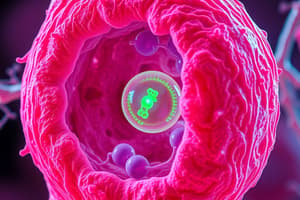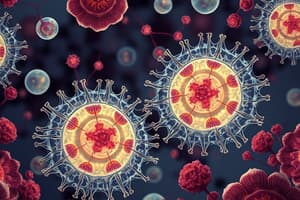Podcast
Questions and Answers
What is the role of some vacuoles during phagocytosis?
What is the role of some vacuoles during phagocytosis?
- Contain enzymes for breaking down food particles (correct)
- Store genetic information
- Assist in cell division
- Participate in photosynthesis
How do tonoplasts in plants help maintain osmotic pressure?
How do tonoplasts in plants help maintain osmotic pressure?
- By producing digestive enzymes
- By storing excess water in the cell (correct)
- By releasing contents outside the cell
- By helping the plant grow tall
Where are ribosomes found in eukaryotic cells?
Where are ribosomes found in eukaryotic cells?
- Attached to the cell membrane
- In the mitochondria
- Within the cytoplasm (correct)
- Within the nucleus
What is the primary function of ribosomes in protein synthesis?
What is the primary function of ribosomes in protein synthesis?
How do vacuoles contribute to maintaining osmotic pressure in plants?
How do vacuoles contribute to maintaining osmotic pressure in plants?
Why is understanding ribosome function essential in drug development?
Why is understanding ribosome function essential in drug development?
What is the primary function of vacuoles in eukaryotic cells?
What is the primary function of vacuoles in eukaryotic cells?
Which organelle is responsible for protein synthesis within cells?
Which organelle is responsible for protein synthesis within cells?
What is the main focus of cell biology?
What is the main focus of cell biology?
Which process is NOT associated with cell biology?
Which process is NOT associated with cell biology?
How do cell biologists contribute to disease research?
How do cell biologists contribute to disease research?
What distinguishes eukaryotic cells from prokaryotic cells?
What distinguishes eukaryotic cells from prokaryotic cells?
Study Notes
Biology: Exploring the World of Cells and Organelles
Biology, the science of life, is a vast discipline that encompasses various subtopics, including cell biology, vacuoles, and ribosomes. These areas of study reveal the intricate details of life processes, providing insights into the functioning of cells, their structures, and the role of essential organelles.
Overview of Cell Biology
Cell biology focuses on the study of cells—the fundamental units of life. Every living organism is composed of cells, which vary in size, shape, and function depending on their position and development stage. Cell biologists investigate cell structures, reproduction, growth, and maintenance. They explore the processes that occur within cells, such as cellular respiration, DNA transcription, translation, and protein synthesis. By understanding these fundamental aspects of life, researchers can develop therapies for diseases caused by genetic mutations, improve crop yields by manipulating plant growth, and create new materials with unique properties based on biological structures.
Vacuoles: The Versatile Organelles
Vacuoles are membrane-bound compartments found in eukaryotic cells. Their primary function is to store water, nutrients, and waste products. However, they also play crucial roles in other cellular activities. For example, some vacuoles contain digestive enzymes that break down food particles during phagocytosis, while others participate in exocytosis, where their contents are released outside the cell. Additionally, some plants use specialized vacuoles called tonoplasts to maintain osmotic pressure, which helps them grow tall and reach towards sunlight. Understanding the role of vacuoles provides insights into how cells respond to external stimuli and adapt to changing environments.
Ribosomes: The Protein Machines
Ribosomes are another important organelle involved in protein synthesis. These complex structures consist of two subunits—the smaller 40S subunit and the larger 60S subunit. Together, they translate genetic information encoded in messenger RNA (mRNA) into specific amino acid sequences, forming polypeptides that eventually fold into functional proteins. Ribosomes are present in both prokaryotic and eukaryotic cells, where they are attached to the cell membrane or located within the cytoplasm, respectively. Understanding ribosome function is essential for developing new drugs that target protein production in pathogens, such as bacteria and viruses.
In conclusion, cell biology, vacuoles, and ribosomes are all integral parts of the larger field of biology. By studying these aspects, we gain a deeper understanding of life processes and can apply this knowledge to address various challenges, from developing new medications to improving agricultural practices. As research continues to advance, our understanding of these topics will only grow, providing new opportunities for scientific discovery and innovation.
Studying That Suits You
Use AI to generate personalized quizzes and flashcards to suit your learning preferences.
Description
Explore the fascinating world of cell biology, vacuoles, and ribosomes through this quiz. Test your knowledge on the structures, functions, and significance of these essential components within living organisms.




